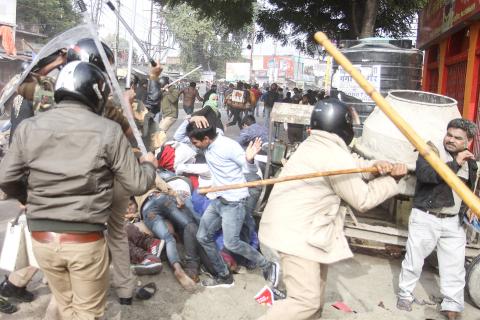Fresh clashes between Indian police and demonstrators erupted yesterday after more than a week of deadly unrest triggered by a citizenship law seen as anti-Muslim.
Three protesters on Thursday were shot dead, taking the death toll to nine in the wave of anger that is emerging as a major challenge to Indian Prime Minister Narendra Modi.
The law making it easier for persecuted minorities from three neighboring nations to get citizenship, but not if they are Muslims, has stoked fears that Modi wants to remould India as a Hindu nation, which he denies.

Photo: AFP
Tens of thousands on Thursday filled the streets nationwide, with violence erupting in several places, including Lucknow, Mangaluru and Modi’s home state of Gujarat.
In Mangaluru, security forces opened fire on a crowd of about 200 people after they ignored orders to disperse, killing two people, police spokesman Qadir Shah said.
Four others were taken to hospital with gunshot wounds.

Photo: AFP
“They marched toward the busiest area of Mangaluru. This led to [a] lathi [big, wooden stick] charge. Then the tear gas was fired. When the protesters still didn’t stop, the police had to open fire,” the spokesman said.
Another protester succumbed to gunshot injuries in Lucknow, the capital of India’s most populous state Uttar Pradesh, said a doctor, who did not want to be named, after vehicles and a police post were set on fire.
Police denied opening fire in the city, which is home to a large Muslim minority, but the father of the victim told the Times of India that his son was shot after getting caught in a crowd of protesters while out to buy groceries.
Fresh clashes erupted in Lucknow yesterday when police halted a few hundred people on their way to a planned protest, with security forces firing tear gas and charging with batons, a reporter said.
Elsewhere, there were no major incidents, although police bundled hundreds of people onto buses in Delhi and Bengaluru after they defied bans on assembly, including a prominent rights advocate and a renowned historian.
The protests have in places seen demonstrators hurl rocks at security forces and set fire to vehicles, while alleged police brutality has fueled the anger.
The authorities have scrambled to contain the situation, imposing emergency laws, blocking Internet access, and shutting down shops and restaurants in sensitive areas.
In Uttar Pradesh, mobile Internet and text-messaging services were cut in several areas.
In an editorial, the Indian Express yesterday said that the government must do all it can “to keep the peace, but in doing so the world’s largest democracy cannot look like it cannot accommodate its young who disagree, it cannot afford to signal that it is so ill at ease with itself.”
“India risks a lot if it begins to be seen as a place where the dissenter’s mind is not without fear,” it said.

Kehinde Sanni spends his days smoothing out dents and repainting scratched bumpers in a modest autobody shop in Lagos. He has never left Nigeria, yet he speaks glowingly of Burkina Faso military leader Ibrahim Traore. “Nigeria needs someone like Ibrahim Traore of Burkina Faso. He is doing well for his country,” Sanni said. His admiration is shaped by a steady stream of viral videos, memes and social media posts — many misleading or outright false — portraying Traore as a fearless reformer who defied Western powers and reclaimed his country’s dignity. The Burkinabe strongman swept into power following a coup in September 2022

‘FRAGMENTING’: British politics have for a long time been dominated by the Labor Party and the Tories, but polls suggest that Reform now poses a significant challenge Hard-right upstarts Reform UK snatched a parliamentary seat from British Prime Minister Keir Starmer’s Labor Party yesterday in local elections that dealt a blow to the UK’s two establishment parties. Reform, led by anti-immigrant firebrand Nigel Farage, won the by-election in Runcorn and Helsby in northwest England by just six votes, as it picked up gains in other localities, including one mayoralty. The group’s strong showing continues momentum it built up at last year’s general election and appears to confirm a trend that the UK is entering an era of multi-party politics. “For the movement, for the party it’s a very, very big

ENTERTAINMENT: Rio officials have a history of organizing massive concerts on Copacabana Beach, with Madonna’s show drawing about 1.6 million fans last year Lady Gaga on Saturday night gave a free concert in front of 2 million fans who poured onto Copacabana Beach in Rio de Janeiro for the biggest show of her career. “Tonight, we’re making history... Thank you for making history with me,” Lady Gaga told a screaming crowd. The Mother Monster, as she is known, started the show at about 10:10pm local time with her 2011 song Bloody Mary. Cries of joy rose from the tightly packed fans who sang and danced shoulder-to-shoulder on the vast stretch of sand. Concert organizers said 2.1 million people attended the show. Lady Gaga

SUPPORT: The Australian prime minister promised to back Kyiv against Russia’s invasion, saying: ‘That’s my government’s position. It was yesterday. It still is’ Left-leaning Australian Prime Minister Anthony Albanese yesterday basked in his landslide election win, promising a “disciplined, orderly” government to confront cost-of-living pain and tariff turmoil. People clapped as the 62-year-old and his fiancee, Jodie Haydon, who visited his old inner Sydney haunt, Cafe Italia, surrounded by a crowd of jostling photographers and journalists. Albanese’s Labor Party is on course to win at least 83 seats in the 150-member parliament, partial results showed. Opposition leader Peter Dutton’s conservative Liberal-National coalition had just 38 seats, and other parties 12. Another 17 seats were still in doubt. “We will be a disciplined, orderly